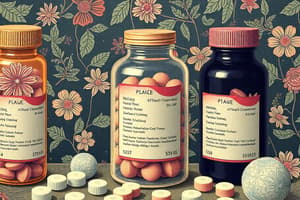Podcast
Questions and Answers
What does pharmacokinetics specifically describe?
What does pharmacokinetics specifically describe?
- How the body handles and processes drugs (correct)
- The classification of drugs based on their chemical structure
- The potential side effects of drug treatments
- The mechanisms through which drugs interact with molecular targets
Which of the following drug classes is primarily used as antimicrobial agents?
Which of the following drug classes is primarily used as antimicrobial agents?
- Antibiotics (correct)
- Hormones
- Analgesics
- Antidepressants
What mechanism of drug action involves a drug binding to a receptor and activating it?
What mechanism of drug action involves a drug binding to a receptor and activating it?
- Antagonism
- Agonism (correct)
- Non-competitive inhibition
- Competitive inhibition
How can patient-specific factors affect drug response?
How can patient-specific factors affect drug response?
What is the primary focus of pharmacodynamics?
What is the primary focus of pharmacodynamics?
What is the primary purpose of rigorous testing and evaluation in drug development?
What is the primary purpose of rigorous testing and evaluation in drug development?
Which route of drug administration is most likely to provide the highest bioavailability?
Which route of drug administration is most likely to provide the highest bioavailability?
What factor is essential for drug design to ensure effectiveness and minimize side effects?
What factor is essential for drug design to ensure effectiveness and minimize side effects?
What ethical consideration is crucial during drug development?
What ethical consideration is crucial during drug development?
Pharmacology indicates that understanding mechanisms and dynamics of drugs is important for what reason?
Pharmacology indicates that understanding mechanisms and dynamics of drugs is important for what reason?
Flashcards
Pharmacology
Pharmacology
The study of drugs and how they interact with living organisms.
Drug Classification
Drug Classification
Categorizing drugs based on their use, structure, or action.
Pharmacokinetics
Pharmacokinetics
How the body absorbs, distributes, metabolizes, and excretes drugs.
Mechanism of Drug action
Mechanism of Drug action
Signup and view all the flashcards
Drug Targets
Drug Targets
Signup and view all the flashcards
Drug Testing Phases
Drug Testing Phases
Signup and view all the flashcards
Drug Administration Routes
Drug Administration Routes
Signup and view all the flashcards
Drug Design
Drug Design
Signup and view all the flashcards
Pharmacology Applications
Pharmacology Applications
Signup and view all the flashcards
Ethical Drug Development
Ethical Drug Development
Signup and view all the flashcards
Study Notes
Introduction to Pharmacology
- Pharmacology is the study of drugs and their interactions with living systems.
- It encompasses drug discovery, development, and application.
- Understanding drug mechanisms of action and their effects on the body is central to pharmacology.
Drug Classification
- Drugs are classified based on their therapeutic uses, chemical structures, or mechanisms of action.
- Examples of classifications include:
- Analgesics (pain relievers)
- Antibiotics (antimicrobial agents)
- Antidepressants
- Cardiovascular drugs
- Hormones
Drug Actions
- Drugs alter physiological processes by interacting with specific molecular targets in the body.
- These targets include enzymes, receptors, ion channels, and nucleic acids.
- Drug interactions with targets involve various mechanisms:
- Competitive inhibition
- Non-competitive inhibition
- Allosteric modulation
- Agonism
- Antagonism
- Understanding the mechanisms allows for better prediction of how drugs will act.
Pharmacokinetics
- Pharmacokinetics describes how the body handles and processes drugs.
- It involves four key processes: absorption, distribution, metabolism, and excretion (ADME).
- Absorption refers to drug movement from the site of administration into the bloodstream.
- Distribution describes how drugs are transported throughout the body.
- Metabolism (biotransformation) involves the alteration of drug molecules by the body.
- Excretion is the elimination of drugs from the body.
Pharmacodynamics
- Pharmacodynamics investigates the effects of drugs on the body.
- It describes how drug action targets specific cellular mechanisms.
- It focuses on the relationship between drug concentration and the magnitude of the effect.
Factors Influencing Drug Response
- Patient-specific factors like age, genetic makeup, and pre-existing medical conditions often influence how drugs are metabolized and act.
- Drug-drug interactions occur when multiple drugs are taken, potentially altering the effects of either drug.
Drug Safety and Toxicity
- Potential side effects or adverse reactions are always a concern.
- Appropriate drug dosages are crucial in managing potential harm.
- Monitoring drug levels in the blood is often necessary to assess safety.
- Toxicity involves harmful effects of drugs. Understanding the mechanisms of toxicity is crucial.
Drug Development
- Drug development is a complex and rigorous process.
- Phases of drug testing involve pre-clinical studies and various clinical trials.
- Rigorous testing and evaluation are crucial for ensuring safety and efficacy. Regulatory review is a significant step.
Drug Administration
- Different routes of administration influence absorption and consequent effects.
- Examples include oral, intravenous, intramuscular, and topical routes.
- Administration pathways affect drug bioavailability.
Drug Design
- Drug design employs rational approaches.
- Molecular modeling and optimization of drug structure are used to maximize therapeutic effects and minimize unwanted side effects.
Drug Uses in Various Therapeutic Areas
- Pharmacology has widespread applications in various therapeutic areas:
- Infectious diseases
- Cardiovascular disorders
- Neurological disorders
- Oncology
- Psychiatry
- Pain management
- Other diseases/conditions
Ethical Considerations
- Ethical guidelines and regulations govern the use and development of drugs.
- Issues of patient safety and informed consent are crucial.
- Drug development must adhere to ethical standards.
Conclusion
- Pharmacology is a multi-faceted field impacting numerous aspects of human health.
- A firm understanding of drug mechanisms, actions, pharmacokinetics, and pharmacodynamics is essential for safe and effective drug use.
Studying That Suits You
Use AI to generate personalized quizzes and flashcards to suit your learning preferences.




